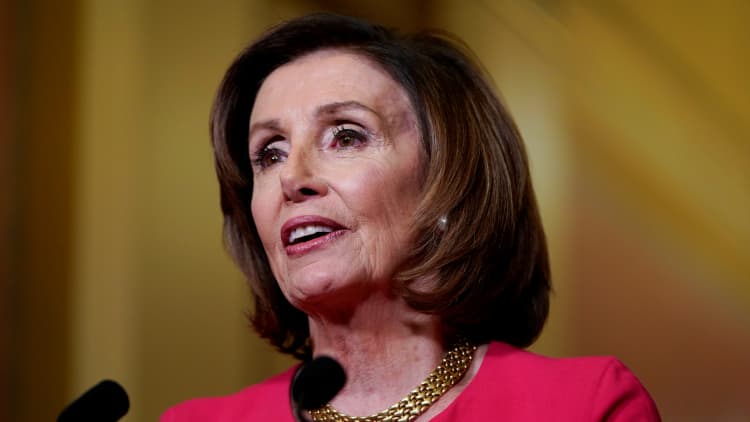The top Democrats in Congress pushed Wednesday for an "interim" emergency coronavirus bill to include at least $500 billion in relief for small businesses, hospitals, states and food assistance programs.
By the afternoon, House Democrats indicated they will try to pass legislation that includes less money specifically for an existing loan program for small companies than the Trump administration has requested.
In a joint statement Wednesday morning, House Speaker Nancy Pelosi and Senate Minority Leader Chuck Schumer said they supported another $250 billion in loans to small companies. A spokesperson for Pelosi later clarified that House Democrats want to put $125 billion into the so-called Paycheck Protection Program — a $350 billion pool of loans approved as part of the $2 trillion emergency package passed last month. Another $125 billion would go to community-based lenders and Small Business Administration disaster assistance loans and grants.
Senate Majority Leader Mitch McConnell aims to pass $250 billion in funding for the existing program through the Senate on Thursday. On a call with House Democrats, Pelosi said she hopes to pass her stopgap bill on Friday.
Meanwhile, Democrats want the stopgap legislation to go further as the coronavirus pandemic rips across the country, stretching health-care resources and state budgets and shutting down schools and businesses. Pelosi and Schumer also called for:
- $100 billion to bolster hospitals and community health centers, with funds going toward the production of coronavirus tests and protective medical equipment
- $150 billion for state and local governments (some officials such as New York Gov. Andrew Cuomo, who is managing the epicenter of the U.S. outbreak, said the last congressional bill did not do enough for states battling coronavirus)
- A 15% increase to the maximum Supplemental Nutrition Assistance Program benefit
It is unclear if the GOP-controlled Senate and Democratic-held House will go through with passing divergent legislation, or if they can agree on a compromise before the planned Senate vote Thursday.
The Democratic leaders described the "interim" bill as separate from one they aim to pass to expand the provisions of the $2 trillion aid package. The federal government has only started to implement the law, the largest emergency spending measure in U.S. history.
"After we pass this interim emergency legislation, Congress will move to pass a CARES 2 Act that will extend and expand the bipartisan CARES Act to meet the needs of the American people," Pelosi and Schumer said. "CARES 2 must provide transformational relief as the American people weather this assault on their lives and livelihoods."

On Tuesday, McConnell said he would try to pass the additional small business funding by unanimous consent or voice vote during the Senate's pro forma session on Thursday. In a statement, he did not mention any other provisions he wants to see in the bill.
Sen. Marco Rubio, a Florida Republican and chairman of the Senate Small Business and Entrepreneurship Committee, said Wednesday that McConnell put forward a unanimous consent agreement to introduce and pass by voice vote a measure to inject $250 billion into the small business program.
"Any Senator objecting is asked to do so by noon today. Hope for the best," he wrote in a tweet.
Any one senator can stop legislation from passing by unanimous consent.
A spokesman for McConnell did not immediately respond to a request to comment on whether the Kentucky Republican would consider adding any of the Democrats' priorities to the proposal this week.
In response to the Democrats' request to fund health care and states, a Trump administration official said "continuing to focus on the need to help small businesses right now would be a help."
Congress is out of Washington as the pandemic wreaks havoc on the country. The U.S. now has more than 400,000 COVID-19 cases, and the disease has been linked to at least 13,000 deaths, according to data compiled by Johns Hopkins University.
It has also devastated the economy. About 10 million people filed new unemployment claims over a two-week period, and the U.S. lost 701,000 jobs in early March — before the biggest wave of business shutdowns.
The CARES Act passed last month included direct payments to individuals, enhanced unemployment insurance, small business loans, health-care funding and a $500 billion pool of loans and grants for corporations and states.
Pelosi has called for another round of checks to individuals and to extend the unemployment benefits for two more months.
— CNBC's Ylan Mui contributed to this report


